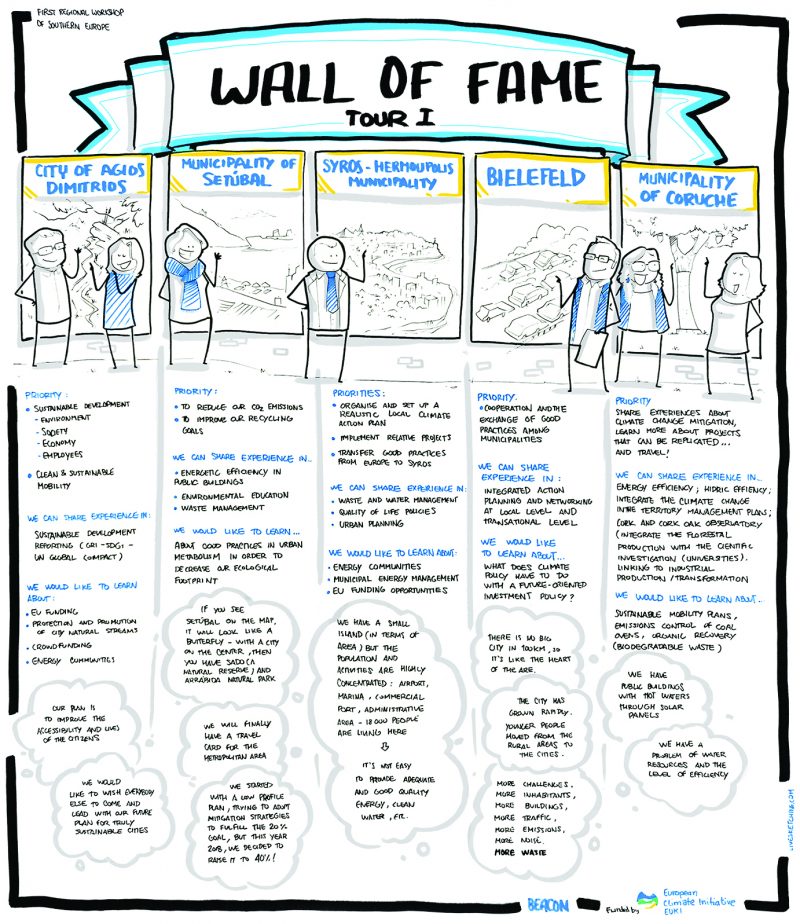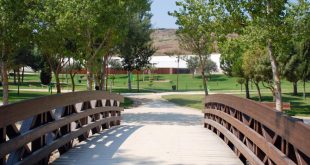In Coruche, a municipal strategy has been initiated with the aim of lowering the consumption and improving the reuse of resources. But difficulties are being encountered in the implementation of far-reaching changes in a municipality faced with desertification, an ageing population and the disappearance of family-based agriculture. I talked with Patrícia Moreira, from the department of land use development and planning, and Rosa Lopes, who is the council’s representative in matters relating to waste management, as well as energy and water efficiency.
Coruche started last year with severe flooding, and later had record high temperatures, with several days at 46º. How do you feel about climate change, living in Coruche?
Rosa Lopes: It’s a reality, obviously. It’s not a myth. Municipalities have to adapt and they have to provide public buildings and urban spaces with greater resilience to climate change. This is obvious.
Patrícia Moreira: There was already a drought in 2017, when Viseu had to restrict public water supplies, and this was distressing, because one of the largest reservoirs we have, the huge Monte da Barca reservoir, was at zero capacity! It brought tears to the eyes. We saw a very large number of cork-oaks die. Last year, we were on the television news for several days because of the heat wave and the nights without any cooling effect. The media plays a very alarming role. Coruche is the council with the largest elderly population in the region, and, just to give you a personal example, for the first time, my mother-in-law said that she felt panic due to heat stress. She is a country woman, very strong, very resilient. We also had a tornado and other extreme events. It’s something that affects people’s lives, and which is a very recent phenomenon. Old people are vulnerable and we have to take action.
You are one of the 26 municipalities that have become involved in the Climate-ADAPT programme and you have just produced your municipal strategy for adaptation to climate change…
Patrícia Moreira: Yes, there is one munici-
pality for each intermunicipal community. The objective is to replicate the strategy that we’ve created for the Lezíria do Tejo region.
What are the essential points?
Rosa Lopes: There are 47 measures…! The three central pillars on which everything rests are the forest, energy and health. The forest, from the aspect of land use and management. Energy, because of greenhouse gas emissions. Human health, because an ageing population is particularly vulnerable.
We’ve had some projects in the area of energy efficiency. We already have street lighting that comes totally from LEDs; public buildings have solar panels and photovoltaic systems for energy production; and we now have applications for renovating and refurbishing public buildings, for monitoring efficiency and reducing energy consumption.
Patrícia Moreira: We are reviewing the PDM (the Municipal Master Plan), with the new capacities that the councils now have in terms of agriculture and forestry planning. In agriculture, we have to deal with the issue of water management – as water is going to become an increasingly scarce resource. In Coruche, we stand on top of one of the largest groundwater reservoirs, but its incorrect use by agriculture and the alteration of the drainage basins may cause problems.
As far as forest management is concerned, we have villages with some desertification and there is an increasing encroachment into built-up rural areas of more flammable species of trees, essentially eucalyptus and pine. With a large increase in temperature and a huge decrease in rainfall, we will have more fires.
Are there any indications about what to do?
Patrícia Moreira: The law requires us to have a protective strip of land of 100 metres. One of the things that all the media like to talk about is the need for people to clean around their houses. But if this type of measure isn’t accompanied by our discontinuing patches of forest and making the most of the valleys with watercourses… In the past, these valleys were cultivated, but today they’re abandoned and overgrown, serving as perfect motorways for the spread of fire. The point is that it’s not worth having all these very interesting plans, if, afterwards, private individuals are not made aware of, and will not adopt, those kinds of practices. We must also bear in mind that the forest is an important source of income for families, which we cannot disregard. In the past, people worked with agriculture: they had vineyards. Now they don’t, they can’t dig, and their children aren’t there any more… So, they plant the trees there and, after a few years, it gives them something.
And is there support for family farming?
Patrícia Moreira: Our municipality doesn’t cover this. The older people still work on their farms. The younger population has moved away from agriculture – there is a perception that smallholdings are connected with people with difficulties, an escape from urban life. We have urban gardens, but on a very small scale.
The “foros” (rural population areas) are a type of settlement that is characteristic of the Ribatejo. The large estates surrounded less fertile land and the people settled there. They are our villages. Each foro had about five acres, each family a little bit of land and there was subsistence farming there. But it’s the old people who are now being abandoned. We have the difficult situation of abandoned land around the houses that was once farmed, and which is now being taken over by eucalyptus.
What can be done to stop this exodus and promote agricultural development?
Patrícia Moreira: It isn’t easy. There’s been a big drop in population. A lot more work is required to raise people’s awareness.
Can you give us concrete examples of measures that the municipality is taking?
Rosa Lopes: For example, in buildings: the replacement of the panes of sash windows with glass that causes a lower thermal loss and the replacement of roofs, together with the installation of exterior insulation. For swimming pools, we’ll install pumps that consume much less energy than existing ones, we’ll cover the water surface after use, so there is no loss in temperature at night. The wastewater from the pools is reused for irrigation purposes and to supply the fire-engines.
The replacement of the lighting in buildings with LEDs. More efficient electrical equipment, with a special programme that means they only operate during certain periods, and a reduction in excessive consumption and bad practices.
Will smaller and local companies be used, and will we be less reliant on large multinationals?
Rosa Lopes: This has to do with whoever is competing for contracts, we can’t impose restrictions in these matters. It’s possible in certain instances, but it’s very difficult to get around, because there’s a public procurement law.
As far as waste collection is concerned, most of the country’s current practices are based on the idea that organic and non-organic waste is mixed together and sent to landfill. Are they planning to begin separate collections in Coruche?
Yes. An intermunicipal company in two municipalities, Coruche and Almeirim, will take over the collection of waste, with an integrated system. There will be a selective door-to-door collection. Waste collected in this way is known to be of a higher quality both for biological treatment and for recycling. It was a funded project that was supposed to start at the beginning of 2019. It will soon start as a pilot scheme and the idea is then to expand it. The first months will be used for raising awareness, providing information and clarifying doubts, and, in the second half of this year, we can move forward.
How is the waste reclaimed?
Rosa Lopes: Organic waste is used for the production of compost; the rest is used for recycling. It’s not the local authority that does this: we are part of Resitejo, which is creating a treatment plant for organic waste.
And will an incentive also be introduced for domestic composting?
Rosa Lopes: Yes, a project is going to be launched for promoting homemade compost. It will start in a residential area, and it is designed especially for individual homes, where it’s easy to have a composter.
Thank you.
 Eco123 Revista da Economia e Ecologia
Eco123 Revista da Economia e Ecologia


